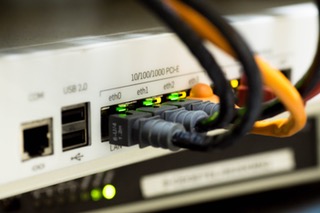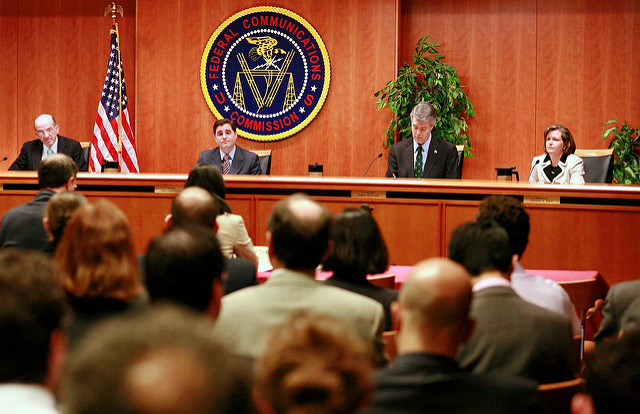Tag Archives: FCC
California: Weighing a Response on Internet Privacy
by Mike McPhate, New York Times

President Trump this month signed a resolution to undo internet privacy rules that would have kept companies like AT&T and Comcast from selling users’ browsing histories and other personal data. Almost immediately, a number of states moved to pass new rules that would in effect replicate those nullified by Congress. But California, a pioneer of privacy protections, has so far been silent. Read More ›
FCC Adopts New Privacy Rule, Limits What ISPs Can Do With Your Data
by Kate Cox, The Consumerist

“Consumers should not have to be network engineers to understand who is collecting their data, and they should not have to be lawyers to understand if their information is protected. So it is incumbent upon every policy-maker with privacy authority to think about how to make our policies more simple and more consistent,” wrote Commissioner Jessica Rosenworcel. Read More ›
CFC Applauds FCC Chairman Wheeler’s Broadband Privacy Proposal

The FCC Chairman’s proposal would prohibit Broadband Internet Access Service (BIAS) providers from sharing sensitive information without a consumer’s consent. The proposal also requires BIAS providers to inform consumers about what information they collect and with whom that information is shared. Read More ›
AT&T Stops Charging Broadband Users Extra For Privacy
by Karl Bode, TechDirt

While AT&T claims it’s just concerned about “simplicity,” the real reason is because the FCC is considering some basic privacy protections for broadband users, who often can’t vote against bad behavior with their wallet thanks to the lack of competition in the broadband space. Read More ›
Cable And Telecom Firms Score A Huge Win In Their War To Kill Municipal Broadband
by Michael Hiltzik, Los Angeles Times

“ISPs, especially Comcast and AT&T, have lobbied for these restrictions all over the country,” says Andrew Jay Schwartzman, a veteran telecommunications consumer advocate. Read More ›
Advocates Say Verizon-Yahoo Deal Shows Need For Privacy Rules
by David McCabe, The Hill

The acquisition — a sign of Verizon’s growing interest in the advertising business — comes as the Federal Communications Commission (FCC) moves toward a final vote on the hotly contested proposed rules, which would require internet providers to get permission before using their customers data for most advertising purposes. Read More ›
Is Your Set-Top Box Telling Advertisers What You Watch?
by David Lazarus, Los Angeles Times

“They’re hiding the ball,” said Dallas Harris, a policy fellow with the advocacy group Public Knowledge who co-wrote the complaints [to the FCC and FTC]. “They say in their privacy policies that they may collect data on you and they may use it for marketing. They know that’s what they’re doing. So there’s a big disconnect between what they say and what’s actually happening.” Read More ›
Cable And Telecom Companies Just Lost A Huge Court Battle On Net Neutrality
by Brian Fung, Washington Post

The court verdict puts to rest — for now — a key question: Whether the Internet represents a vital communications platform that deserves to be regulated with the same scrutiny as the common networks of the past, such as the telephone system. Read More ›
Consumer Advocates Back FCC Proposal For Broadband Privacy Rules
by Rick Weber, Inside Cybersecurity

Consumer advocates are backing the general intention of a Federal Communications Commission proposal that would impose privacy requirements on Internet service providers. Read More ›
CFC Applauds FCC Move To Protect Broadband Privacy
“Today’s vote is a significant advance for privacy protection. Consumers should decide whether their online activities and other personal data are shared with third-party strangers,” CFC Executive Director Richard Holober said. “It is essential that any final FCC rule prohibits broadband carriers from charging extra for privacy. Privacy is a right that should not be available only to the wealthy.” Read More ›
Broadband Industry: It’s Unfair If Facebook Can Collect Your Data, But AT&T Can’t
by Kate Cox, Consumerist

Later this week, the Federal Communications Commission will be voting on a proposal intended to protect some of your personal data from being shared by your Internet service provider, by requiring that the ISP first get your permission. … ISPs are the conduit for everything you do online, meaning they have access to a lot of potentially sensitive information about you … data about what sites you visit. When. For how long … Read More ›
Proposed FCC Rules Would Limit How Internet Service Providers Can Use Your Data
by Jim Puzzanghera, Los Angeles Times

“Simply by using the Internet, you have no choice but to share large amounts of personal information with your broadband provider,” FCC Chairman Tom Wheeler said in an article on the Huffington Post. “You have a right to know what information is being collected about you and how that information is being used. … If you have a mobile device, your provider can track your physical location throughout the day in real time. … The bottom line is that it’s your data,” he said. “How it’s used and shared should be your choice.” Read More ›
FCC Proposes Expanding ‘Obamaphone’ To Internet
by Tom Risen, U.S. News & World Report

FCC Chairman Tom Wheeler on Tuesday explained his proposal to expand the Lifeline program aims to assist some of the 64 million Americans who have difficulty affording Internet access. … “Internet access has become a pre-requisite for full participation in our economy and our society, but nearly one in five Americans is still not benefitting from the opportunities made possible by the most powerful and pervasive platform in history,” [Wheeler wrote.] Though often called “Obamaphone” by its critics, the Lifeline program was launched in 1985 by Ronald Reagan’s administration and offered a $9.25-per-month subsidy to help low-income Americans pay for landline phones. Read More ›